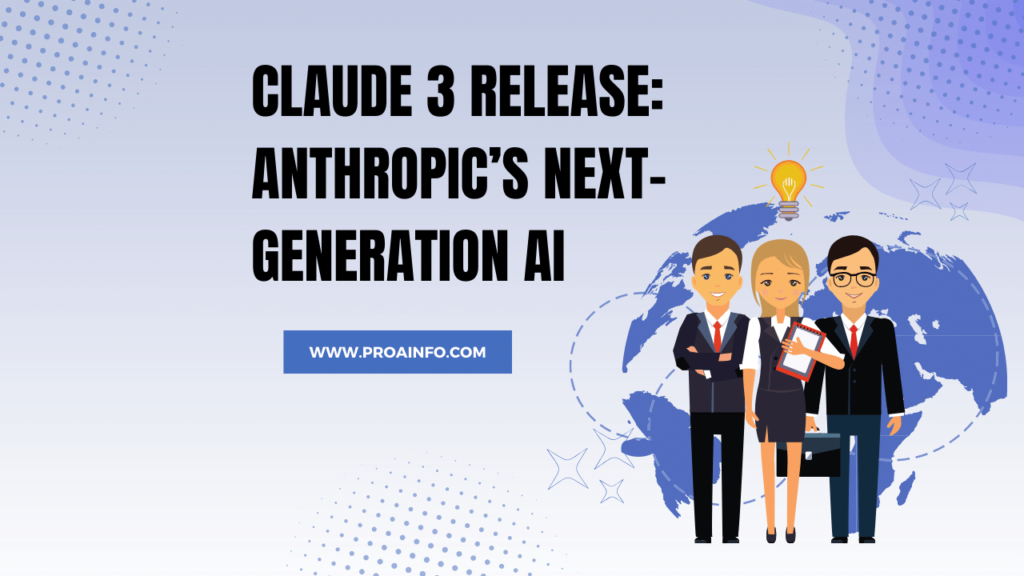Claude 3 Release: Anthropic’s Next-Generation AI. In a groundbreaking development in the field of artificial intelligence, Anthropic, a leading AI research company, has announced the release of Claude, its highly anticipated next-generation AI system. This release marks a significant milestone in the pursuit of advanced AI capabilities, promising to push the boundaries of what is possible with artificial intelligence.
Claude is a culmination of years of extensive research and development by Anthropic’s team of renowned AI experts and researchers. Building upon the successes and learnings from its predecessors, Claude 3 represents a quantum leap forward in AI technology, boasting a myriad of innovative features and capabilities that are poised to revolutionize various sectors and industries.
The Evolution of Claude
To truly appreciate the significance of Claude 3, it is important to understand the journey that led to its creation. Anthropic’s AI journey began with the release of Claude 1, a pioneering AI system that demonstrated the potential of advanced language models and natural language processing. While Claude 1 was groundbreaking in its own right, it was merely the first step in a longer journey.
The release of Claude 2 marked a significant stride forward, with improved performance, expanded capabilities, and a more robust architecture. However, Anthropic’s researchers and engineers recognized the need for a more comprehensive and powerful AI system that could tackle increasingly complex tasks and challenges.
Enter Claude 3, the culmination of Anthropic’s tireless efforts and unwavering commitment to pushing the boundaries of AI. Drawing upon the lessons learned from its predecessors and incorporating cutting-edge research and advancements in the field, Claude 3 promises to deliver an unprecedented level of performance, versatility, and intelligence.
Key Features and Capabilities
Claude 3 boasts an impressive array of features and capabilities that set it apart from its predecessors and other AI systems currently available. Here are some of the key highlights:
1. Enhanced Natural Language Processing (NLP)

One of the core strengths of Claude 3 lies in its advanced natural language processing capabilities. Powered by state-of-the-art language models and neural networks, Claude 3 can understand and interpret human language with remarkable accuracy and nuance.
This enables more natural and intuitive interactions, allowing users to communicate with the AI system as they would with another human.
2. Multimodal Learning and Reasoning
Claude 3 is not limited to just text-based inputs and outputs. It has been designed to process and analyze various forms of data, including images, videos, audio, and structured data.
This multimodal approach enables Claude 3 to learn and reason across multiple modalities, opening up a wealth of new applications and use cases.
3. Contextual Awareness and Adaptability
One of the key challenges in AI has been the ability to understand and adapt to context. Claude 3 addresses this challenge head-on with its advanced contextual awareness capabilities. It can dynamically adjust its behavior, responses, and decision-making process based on the specific context, ensuring relevant and appropriate outputs every time.
4. Continual Learning and Knowledge Expansion

AI systems have traditionally been limited by their fixed knowledge bases, which can quickly become outdated or incomplete.
Claude 3 overcomes this limitation through its continual learning and knowledge expansion capabilities. It can actively acquire new knowledge, update its understanding, and refine its skills over time, ensuring that it remains relevant and up-to-date.
5. Ethical and Responsible AI
As AI systems become more advanced and pervasive, ethical considerations become increasingly important. Anthropic has placed a strong emphasis on ethical and responsible AI development, ensuring that Claude 3 adheres to strict principles and guidelines.
This includes safeguards against potential misuse, bias, and harmful outputs, as well as transparency and accountability measures.
Applications and Use Cases
The versatility and powerful capabilities of Claude 3 open up a wide range of potential applications and use cases across various industries and domains. Here are just a few examples:
1. Healthcare and Medical Research

Claude 3’s ability to process and analyze multimodal data, combined with its continual learning capabilities, makes it an invaluable tool for healthcare and medical research.
It can assist in tasks such as disease diagnosis, drug discovery, and personalized treatment planning, potentially leading to improved patient outcomes and more effective healthcare delivery.
2. Education and Personalized Learning
The educational sector stands to benefit greatly from Claude 3’s contextual awareness and adaptability. By understanding individual learners’ needs, strengths, and weaknesses, Claude 3 can provide personalized learning experiences, tailored educational materials, and adaptive tutoring, enhancing the overall learning experience and outcomes.
3. Customer Service and Support
Claude 3’s natural language processing capabilities and contextual understanding make it an ideal solution for customer service and support applications.
It can handle complex queries, provide personalized recommendations, and offer intelligent assistance, improving customer satisfaction and reducing operational costs.
4. Content Creation and Creative Industries
The creative industries, such as writing, design, and media production, can benefit immensely from Claude 3’s multimodal capabilities and advanced language understanding.
It can assist in tasks such as content ideation, scriptwriting, storyboarding, and even generating creative assets, unleashing new levels of creativity and productivity.
5. Scientific Research and Discovery

The realm of scientific research and discovery is ripe for exploration with Claude 3. Its ability to process and analyze vast amounts of data, combined with its continual learning capabilities, make it a valuable tool for researchers across various fields, from physics and chemistry to biology and computer science.
These are just a few examples of the potential applications and use cases for Claude 3. As this powerful AI system continues to evolve and be adopted across different sectors, new and innovative applications are sure to emerge, pushing the boundaries of what is possible with artificial intelligence.
Challenges and Considerations
While the release of Claude 3 represents a significant milestone in the AI journey, it is important to recognize and address the challenges and considerations that accompany such advanced technology. Some of the key challenges and considerations include:
1. Ethical and Societal Implications
As AI systems become more capable and pervasive, their impact on society and ethical implications cannot be ignored. Anthropic’s commitment to ethical and responsible AI development is commendable, but ongoing vigilance and robust governance frameworks will be crucial to mitigate potential risks and ensure the safe and beneficial deployment of Claude 3.
2. Data Privacy and Security
Claude 3’s ability to process and learn from vast amounts of data raises concerns around data privacy and security. Anthropic must implement stringent measures to protect user data, ensure data sovereignty, and maintain transparency regarding data usage and handling practices.
3. Workforce Implications and Skill Development
The introduction of advanced AI systems like Claude 3 will undoubtedly have implications for the workforce and job market.
While it can augment and enhance human capabilities, there may be concerns about potential job displacement or the need for reskilling and upskilling in certain industries. Proactive measures and policies will be required to address these challenges and ensure a smooth transition.
4. Bias and Fairness
AI systems are not immune to biases present in their training data or model architectures. Anthropic must remain vigilant in identifying and mitigating potential biases in Claude 3 to ensure fair and equitable outputs, particularly in sensitive domains such as healthcare, finance, and legal applications.
5. Scalability and Computational Resources
As the adoption and usage of Claude 3 increase, scalability and computational resource requirements will become a critical consideration. Anthropic will need to invest in robust infrastructure and leverage cutting-edge technologies, such as distributed computing and cloud platforms, to meet the growing demand while maintaining performance and efficiency.
These challenges and considerations highlight the importance of a multi-stakeholder approach, involving policymakers, industry leaders, academics, and the broader public. By addressing these issues proactively and collaboratively, the true potential of Claude 3 and other advanced AI systems can be realized while mitigating potential risks and ensuring the responsible development and deployment of these technologies.
The Future of AI and Concluding Thoughts
The release of Claude 3 by Anthropic is a testament to the rapid progress and innovation happening in the field of artificial intelligence. It represents a significant step forward in the pursuit of advanced AI capabilities, paving the way for transformative applications and solutions across various domains.
However, the journey towards truly intelligent and beneficial AI is far from over. As Claude 3 and other AI systems continue to evolve and become more capable, it is crucial to maintain a balanced perspective, addressing ethical concerns, fostering responsible development, and ensuring that these technologies are deployed in ways that benefit humanity as a whole.
Anthropic’s commitment to ethical and responsible AI development sets a positive example for the industry, but it is a collective responsibility shared by researchers, developers, policymakers, and society at large. By embracing a collaborative and multi-stakeholder approach, we can navigate the challenges and unlock the full potential of AI while ensuring that it remains a force for good.
FAQs
What is Claude 3?
Claude 3 is the latest next-generation AI system developed by Anthropic, a leading AI research company. It represents a significant advancement in AI capabilities, boasting improved natural language processing, multimodal learning, contextual awareness, continual learning, and ethical AI development.
What are the key features of Claude 3?
Some of the key features of Claude 3 include enhanced natural language processing, multimodal learning and reasoning, contextual awareness and adaptability, continual learning and knowledge expansion, and a strong emphasis on ethical and responsible AI development.
How is Claude 3 different from its predecessors, Claude 1 and Claude 2?
Claude 3 builds upon the successes and learnings from Claude 1 and Claude 2, but it represents a quantum leap forward in terms of performance, capabilities, and versatility. It incorporates cutting-edge research and advancements in the field of AI, enabling it to tackle increasingly complex tasks and challenges.
What are some potential applications and use cases for Claude 3?
Claude 3’s versatile capabilities make it suitable for a wide range of applications and use cases, including healthcare and medical research, education and personalized learning, customer service and support, content creation and creative industries, and scientific research and discovery.
How does Anthropic ensure the ethical and responsible development of Claude 3?
Anthropic has placed a strong emphasis on ethical and responsible AI development, incorporating safeguards against potential misuse, bias, and harmful outputs, as well as implementing transparency and accountability measures. The company is committed to upholding strict principles and guidelines to ensure the safe and beneficial deployment of Claude 3.
What are some of the challenges and considerations associated with the release of Claude 3?
Some of the key challenges and considerations include ethical and societal implications, data privacy and security, workforce implications and skill development, bias and fairness, and scalability and computational resource requirements.
How does Anthropic plan to address the scalability and computational resource demands of Claude 3?
Anthropic is expected to invest in robust infrastructure and leverage cutting-edge technologies, such as distributed computing and cloud platforms, to meet the growing demand for Claude 3 while maintaining performance and efficiency.
What is the future of AI, and how does Claude 3 contribute to this journey?
The release of Claude 3 represents a significant step forward in the pursuit of advanced AI capabilities, paving the way for transformative applications and solutions across various domains. However, the journey towards truly intelligent and beneficial AI is far from over, and it is crucial to maintain a balanced perspective, address ethical concerns, and foster responsible development.
How can individuals or organizations get involved with or benefit from Claude 3?
Anthropic is likely to provide more information on how individuals, researchers, and organizations can collaborate or leverage Claude 3 for their specific needs and use cases. Interested parties should stay tuned for updates and announcements from the company.
Where can I find more information about Claude 3 and Anthropic’s AI research?
For the latest updates, news, and information about Claude 3 and Anthropic’s AI research initiatives, it is recommended to visit the company’s official website, follow their social media channels, and subscribe to their newsletters or mailing lists.








3 thoughts on “Claude 3 Release: Anthropic’s Next-Generation AI”